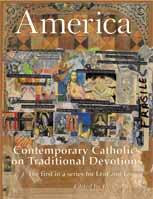A surprising number of studies suggest that the appeal of traditional devotions among younger Catholics is on the rise. Some posit that the phenomenon reflects a growing conservatism among Catholics under 40. Others wonder if younger Catholics, who may not have been forced to participate in devotions as children, feel freer to embrace them on their own. Still others contend that the characteristics of the devotional lifetactile, colorful, often exoticexert a particular influence on young Catholics seeking a greater sense of mystery in their lives.
At the same time, traditional devotions can prompt a variety of responses from older Catholics. For many, the devotional life has never lost its appeal. Many fondly remember reciting the rosary with parents, attending special novena services in their home parish or receiving their first Miraculous Medal or scapular from a favorite aunt or uncle. For some, however, traditional devotions have proven mostly irrelevant, remaining on the fringes of their daily lives as Catholics. For still others the devotional life seems inconsistent with a mature faith, antithetical to contemporary Catholicism and, at times, faintly superstitious.
The wide variety of responses raises some interesting questions. What do traditional devotions have to say to contemporary Catholics? How might a devotion that has seen its popularity wax and wane (and now wax again) speak to Catholics unfamiliar with its appeal? Can devotions that often carry heavy theological and cultural baggage find a place in the post-Vatican II church? In short, what might devotions mean today?
This series for Lent and Easter focuses on the world of devotions in the life of contemporary believers. America asked a number of Catholics, some in their 30’s or 40’s, to write about a favorite devotionits history, its place in his or her life and its possible role in the life of contemporary believers. In this second part of the series we look at three: the Angelus, first Fridays and the Stations of the Cross.








